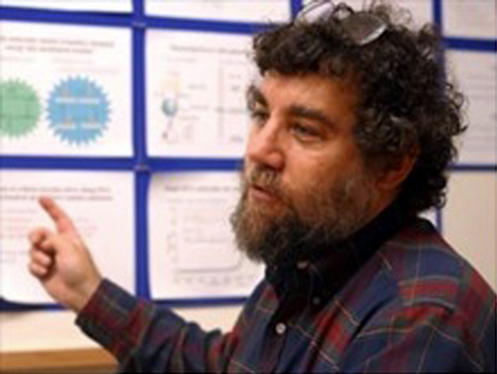FAYETTEVILLE, Ark. – Biophysicist Steven M. Block will speak on “Facing the Growing Threat of Bioterrorism” as the 2010 Robert D. Maurer Distinguished Lecturer. The lecture series, sponsored by the department of physics in the J. William Fulbright College of Arts and Sciences, is named after alumnus Robert D. Maurer, co-inventor of the first telecommunications-grade optical fiber.
This 14th annual Maurer Distinguished Lecture, which is free and open to the public, will be held at 7:30 p.m. Thursday, March 18, in Giffels Auditorium, second floor of Old Main on the university campus. A reception will follow.
In his lecture, Block will describe how the extraordinary pace of modern biotechnology makes it necessary to contemplate a whole new generation of biological weapons, including those based on genetically engineered pathogens. He will discuss how the United States, along with the world at large, struggles to cope with ongoing threats posed by the current generation of biological weapons and also by naturally occurring infectious diseases, which he contends are by no means under control. He will discuss how thinking behind our effort to limit biological weaponry has been influenced by a legacy of nonproliferation approaches developed during the past half-century to limit the spread and use of nuclear weapons.
Because nuclear and biological weapons of mass destruction differ in fundamental ways, so do the most effective strategies to counter them. Block will discuss how recent legislative efforts to regulate pathogens seem to be doing more to damage the country’s ability to muster nimble defenses against bioweaponry than to inhibit the access of a potential adversary to these same weapons. He proposes that the key to countering threats posed by bioweapons, as well as emerging infectious diseases, will come from developing a powerful national health infrastructure rather than from an ability to preclude or preempt most future attacks.
On Friday, March 19, Block will also deliver a colloquium titled “The Biophysics of Gene Regulation, Studied One Molecule at a Time” in the physics department at 4 p.m. in the Paul Sharrah Lecture Hall, Physics 133. This talk will focus on studies of single-molecule systems that his group has carried out in laser-based optical traps. Using high-resolution instrumentation his group has developed, they can explore nanomechanical properties of individual macromolecules down to the atomic level and monitor, for example, the motions of RNA polymerase molecules in real time as these step from base to base along DNA.
Block, professor of both applied physics and biological sciences at Stanford University, is a member of the independent scientific advisory group JASON . Block has been elected to the U.S. National Academy of Sciences and the American Academy of Arts and Sciences. He has won the Max Delbruck Prize of the American Physical Society as well as the Single Molecule Biophysics Prize of the Biophysical Society. He served as president of the Biophysical Society from 2005 to 2006. While consulting for the United States government through JASON, Block has researched the many threats associated with bioterrorism and headed influential studies on how advances in genetic engineering have impacted biological warfare.
Topics
Contacts
Donna Johnson, office manager, department of physics
J. William Fulbright College of Arts and Sciences
479-575-5915,
Surendra Singh, chair, department of physics
J. William Fulbright College of Arts and Sciences
479-575-2506,
